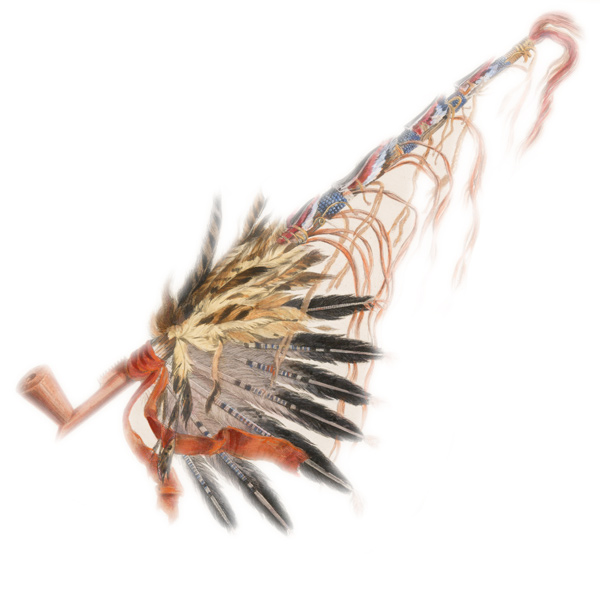At the Knife River Villages in present North Dakota, the captains hear of several broken promises of peace among the tribes with whom they had established peace agreements on the outward journey. Pvt. Colter asks to leave the expedition so that he can go back west with two fur trappers.
Colter Heads Back West
by Yellowstone Public Radio[1]Originally aired weekdays by Yellowstone Public Radio during the Bicentennial observance of 2003-2006. Narrated by Hal Hansen. Scripts by Whit Hansen and Ed Jacobson. Produced by Leni Holliman. © … Continue reading
Peace Pipe
Indian utensils and arms (Detail)
Karl Bodmer (1809–1893)
Rare Book Division, The New York Public Library.[2]“Indianische geräthschaften und waffen. Ustensiles et armes indiens. Indian utensils and arms.” New York Public Library Digital Collections. Accessed February 22, 2019. … Continue reading
Invitation to Washington City
after assembling the Chiefs and Smokeing one pipe, I informed them that I Still Spoke the Same words which we had Spoken to them when we first arived in their Country in the fall of 1804. we then envited them to visit their great father the president of the U. States and to hear his own Councils and receive his Gifts from his own hands as also See the population of a government which Can at their pleasure protect and Secur you from all your enimies
—William Clark
Le Borgne’s Peace
when he [Le Borgne] Saw us last we told him that we had made peaace with all the nations below, Since that time the Seioux had killed 8 of their people and Stole a number of their horses. he Said that he had opened his ears and followed our Councils, he had made peace with the Chyennes [Cheyennes] and rocky mountains [Crow] Indians
—William Clark
Fear of the Sioux
[Chief Le Borgne] Said he wished to go down and See his great father very much, but that the Scioux [Sioux] were in the road and would most certainly kill him or any others who Should go down . . . . if the Sieoux were at peace with them and Could be depended on he as also other Chiefs of the villages would be glad to go and See their great father, but as they were all afraid of the Sieoux they Should not go down &c.
—William Clark
Colter Asks to Leave
Colter one of our men expressed a desire to join Some trappers who offered to become Shearers with and furnish traps &c. the offer a very advantagious one, to him, his Services Could be dispenced with from this down and as we were disposed to be of Service to any one of our party who had performed their duty as well as Colter had done, we agreed to allow him the prvilage provided no one of the party would ask or expect a Similar permission to which they all agreed
—William Clark
Broken Promises of Peace
This evening Charbono [Charbonneau] informed me that our back was scercely turned before a war party from the two menetarry [Hidatsa] villages followed on and attacked and killed the Snake [Lemhi Shoshone] Indians whome we had Seen and in the engagement between them and the Snake indians they had lost two men one of which was the Son of the principal Chief of the little village of the menitarras.
—William Clark
Weather Diary
State of the weather at Sun rise State of wind at Sunrise State of the weather at 4 P. M. Wind at 4 P. M. State of river fair N W fair N. W fall 2 in. —William Clark[3]To assist the reader of this web page, the date column is omitted, some abbreviations have been spelled out, and the three river columns have been merged.
Notes
| ↑1 | Originally aired weekdays by Yellowstone Public Radio during the Bicentennial observance of 2003-2006. Narrated by Hal Hansen. Scripts by Whit Hansen and Ed Jacobson. Produced by Leni Holliman. © 2003 by Yellowstone Public Radio. |
|---|---|
| ↑2 | “Indianische geräthschaften und waffen. Ustensiles et armes indiens. Indian utensils and arms.” New York Public Library Digital Collections. Accessed February 22, 2019. http://digitalcollections.nypl.org/items/510d47da-c46b-a3d9-e040-e00a18064a99. |
| ↑3 | To assist the reader of this web page, the date column is omitted, some abbreviations have been spelled out, and the three river columns have been merged. |
Experience the Lewis and Clark Trail
The Lewis and Clark Trail Experience—our sister site at lewisandclark.travel—connects the world to people and places on the Lewis and Clark Trail.
Discover More
- The Lewis and Clark Expedition: Day by Day by Gary E. Moulton (University of Nebraska Press, 2018). The story in prose, 14 May 1804–23 September 1806.
- The Lewis and Clark Journals: An American Epic of Discovery (abridged) by Gary E. Moulton (University of Nebraska Press, 2003). Selected journal excerpts, 14 May 1804–23 September 1806.
- The Lewis and Clark Journals. by Gary E. Moulton (University of Nebraska Press, 1983–2001). The complete story in 13 volumes.


